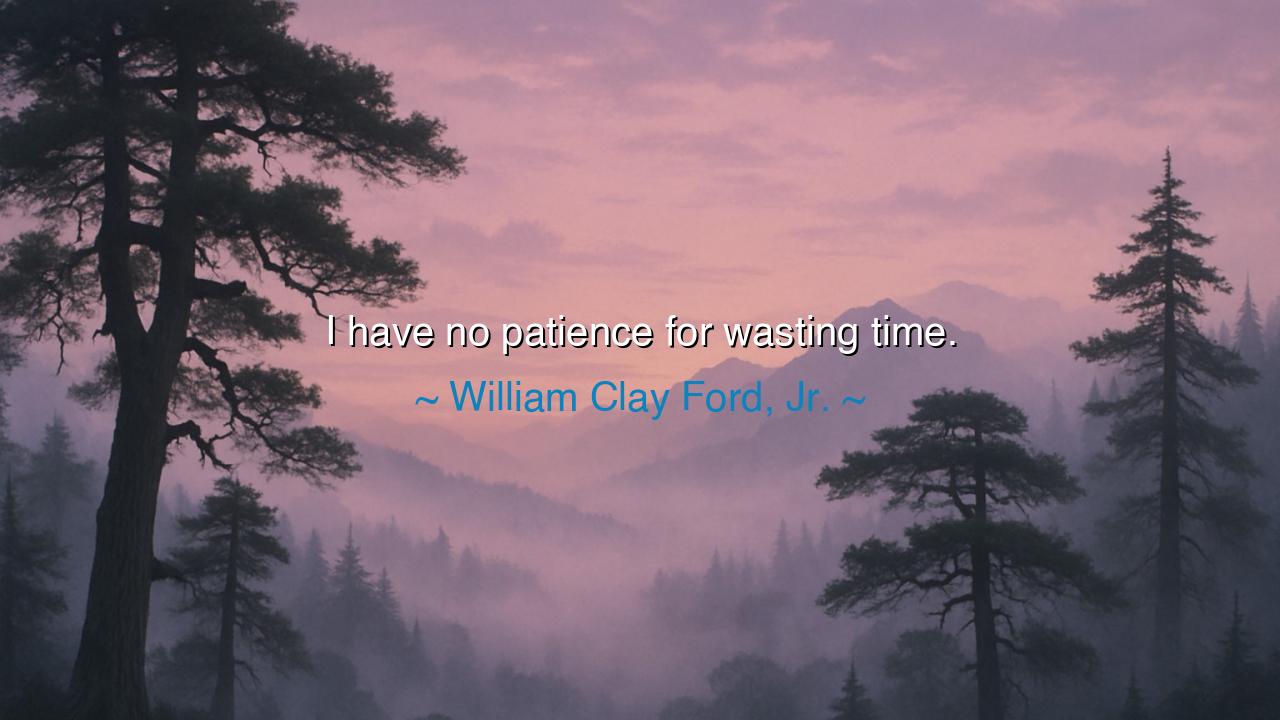
I have no patience for wasting time.






The words of William Clay Ford, Jr., heir to the great automotive dynasty, resound like the strike of a bell: “I have no patience for wasting time.” These are not the words of a man indifferent to leisure, nor of one who despises rest, but the declaration of a leader who understands the sacredness of time. For time is the one treasure given equally to all, yet once spent, it can never be reclaimed. To waste it is to squander life itself, to cast away moments that could have been filled with purpose, creation, or love.
The meaning of his statement is steeped in urgency. Patience, though a virtue in waiting for life’s seasons, must not extend to tolerating idleness or futility. There is a vast difference between resting in preparation and drifting in neglect. Ford’s words reveal the spirit of industry — the belief that each hour should be harnessed toward building, advancing, and fulfilling one’s calling. To waste time is not merely an inconvenience; it is a theft from the future, for what is lost in the present diminishes what may yet be achieved.
Consider the origin of such a conviction. Ford, bearing the legacy of his forefathers, was shaped by the history of a company that transformed the world with the assembly line. His great-grandfather, Henry Ford, knew that efficiency was not simply about profit, but about making automobiles affordable to the common worker, thus democratizing mobility. In that spirit, the family learned that time — when disciplined and directed — multiplies into innovation and prosperity. Wasting it, on the other hand, meant surrendering progress to competitors and losing the rhythm of advancement.
History itself testifies to this truth. When Napoleon marched across Europe, his victories were not solely born of strategy but of speed. He understood that hours lost in hesitation could cost entire campaigns. Conversely, when great empires delayed reforms or lingered in indecision, they crumbled. The fall of Rome, in part, came not from one decisive blow but from generations of neglect, wasted opportunities, and failure to adapt to new challenges. In both triumph and downfall, the measure of time determined destiny.
Ford’s declaration is not a rejection of reflection or careful planning, but a warning against the vanity of procrastination. Many men have filled their days with endless meetings, words without action, or fears that paralyzed their deeds. Such waste erodes both personal potential and collective progress. The wise, however, discern when to pause for renewal and when to strike swiftly. To waste time is to dishonor the gift of existence itself.
The lesson for us is clear and urgent. Guard your hours as a miser guards his gold, but spend them generously on what uplifts and endures. Do not allow trifles, distractions, or shallow pursuits to consume the days of your life. Ask yourself continually: Does this labor bring me closer to my purpose? Does this use of time serve those I love, the work I am entrusted with, and the legacy I wish to leave? If not, cast it aside.
Practical action follows this wisdom. Rise each morning with intent. Set goals that are not merely tasks but stepping-stones toward a greater vision. Allow no meeting, no conversation, no idle pastime to drag endlessly without meaning. Rest when you must, but rest deeply and fully, as part of the rhythm of productivity. Above all, refuse the chains of delay, for delay is the silent thief of dreams.
Let the words of Ford endure as a commandment to the generations: waste not the time that has been given, for in each moment lies the seed of greatness. To squander it is to betray both oneself and the future; to honor it is to carve one’s name in the stone of history. Thus, go forth with urgency, with focus, and with reverence for the fleeting gift of time — for it is the truest wealth of mortals.






AAdministratorAdministrator
Welcome, honored guests. Please leave a comment, we will respond soon